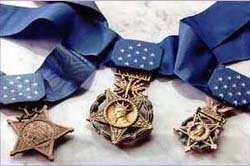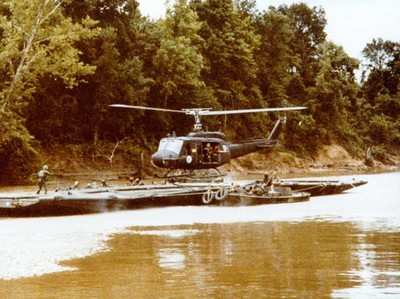Events Portrayed In Film "We Were Soldiers"
 After years of waiting, the call
finally came recently for Bruce Crandall. A White House official
told the retired Army helicopter pilot and Vietnam Veteran he would
soon receive the Medal of Honor -- the highest military medal in
the US.
After years of waiting, the call
finally came recently for Bruce Crandall. A White House official
told the retired Army helicopter pilot and Vietnam Veteran he would
soon receive the Medal of Honor -- the highest military medal in
the US.
USA Today reports Crandall and his wife, Arlene, were driving
their Winnebago motorhome on the first leg of a planned
cross-country trip when the call came in. As Bruce Crandall was
driving, Arlene took the call -- and asked the official to call
back in a few minutes.
"I didn't want him to get all excited and drive us off the
road," Arlene Crandall said.
Crandall's efforts in Vietnam were chronicled in the Mel Gibson
film "We Were Soldiers." Crandall (who was played by Greg Kinnear
in the film) flew lead position in a formation of 16 Huey
helicopters, flying troops to a landing zone in the Ia Drang Valley
-- where a three-day battled pitted 450 American soldiers against
2,000 North Vietnamese troops.
The helicopters flew four sorties to Landing Zone X-Ray on that
day in November 1965 -- ferrying in fresh troops, and evacuating
the wounded. It was during the fifth mission when, as Crandall's
longtime wingman Ed Freeman puts it, "all hell broke lose."
The North Vietnamese troops had surrounded the Americans -- some
by as close as 30 yards. Orders came down to halt the airlift...
leaving Lt. Col. Hal Moore's troops without water, ammunition or
medical supplies.
"If the air bridge failed, the embattled men of the 1st
Battalion, 7th Cavalry would certainly die in much the same way
George Armstrong Custer's cavalrymen died at the Little Bighorn --
cut off; surrounded by numerically superior forces, overrun and
butchered to the last man," Moore later wrote.
Crandall volunteered to continue the flights, and Freeman joined
him. Over the next 24 hours, the men landed in the combat zone 22
times, bringing in much-needed supplies and evacuating at least 70
wounded soldiers. Crandall changed helicopters three times, when
the birds became too damaged by enemy fire to fly.
"Any person who has children would understand what we were
thinking," Crandall said. "If you were standing on a shore of a
lake, and you saw your kids go through the ice, you would go out
and try to get them even if you didn't know how to swim."
The "air bridge" held, and Crandall's airmen were able to resume
flights the next morning. Moore's troops were able to beat back the
North Vietnamese. The mission had been a success... but the full
impact of what he had done didn't strike Crandall until the next
day, when he saw crewmembers washing blood out of his Huey.
"I went around back of a building and vomited," he said. "You
don't let your personal fears get into it. You can't. If you start
thinking along that line, you become a reluctant warrior. And if
you're a leader, you can't do that."

Freeman received the Medal of Honor for his efforts in 2001 --
but Crandall's name failed to appear, even when Congress allowed
reconsideration of medal requests. Freeman says the fact Crandall
hadn't received a medal cast a pall over his ceremony.
"I was hoping we could've stood on the podium together," said
Freeman, who lives in Boise. "But that's all right. He's going to
get it."
 Classic Aero-TV: VerdeGo Debuts VH-3 Hybrid-Electric Powerplant
Classic Aero-TV: VerdeGo Debuts VH-3 Hybrid-Electric Powerplant NTSB Prelim: Grumman American Avn. Corp. AA-5B
NTSB Prelim: Grumman American Avn. Corp. AA-5B ANN's Daily Aero-Linx (12.02.25)
ANN's Daily Aero-Linx (12.02.25) Aero-News: Quote of the Day (12.02.25)
Aero-News: Quote of the Day (12.02.25) Aero-News: Quote of the Day (12.03.25)
Aero-News: Quote of the Day (12.03.25)




